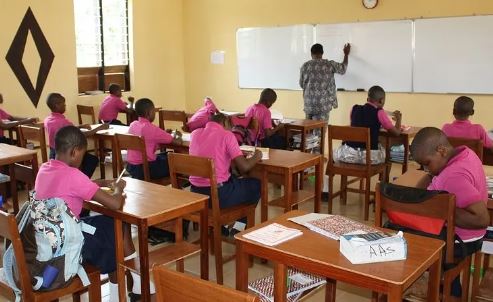The Women Advocates Research and Documentation Centre, WARDC, and other rights groups have called on federal, state and local governments to accord priority to safety of schools across the country.
One of the rights group partners, Mr. Lanre Arogundade of the International Press Centre, IPC, said the project was being led by WARDC to make schools in Nigeria safe for the young ones.
He said majority of the schools in Nigeria lacked basic facilities and government had refused to give adequate attention to them.
“When you go to some school, children are sitting on blocks instead of chairs, they are also having their classes under the trees. We are supposed to have initiatives around education, including universal basic education,
“But these have not been effective. The project is being driven by the fact that the schools are now becoming much more unsafe because of insurgency and banditry and kidnappings; sometimes school children are being abducted.
“In line with the international commitment of Nigeria, we believe the time has come to take this quite seriously. As it is now, Nigeria accounts for fifteen per cent globally of children that out of school. We are worried that if our schools continue to remain unsafe the institutions may become worse.”
He added that, at the rate thing were going, the number of out of school children might increase as many parents didn’t see any reason to allow their children to go to school in Nigeria, any longer.
“This is the reason why the initiative is very important for us to be able to bring pressure to bear on the local government, state and the federal government as well to play their roles to make schools safe across the country for the students. I believe it is the media that’s capable to set the agenda in this regard,” Arogundade said.
He noted that government at all levels should accord priority to safety of schools in Nigeria and practical action must be taken in that regard.
READ ALSO: Truck plunges from Pen Cinema Bridge
“There should be cooperation between the state and federal security forces; there should also be the involvement of the community too in the security of schools. The traditional rules and everybody that can be considered as a stakeholders can have a role to play, which means that the government must have a series of multi-stakeholders forum to address the issue of unsafe schools in every part of the country.
“The problem are not the same everywhere -everyone with different challenges. It is important we make school environment safe for the children and in some instances, where it is necessary, schools can be relocated to area that are safer. That means government must commit resources if we don’t want many children to be out of school. Government needs to provide the resources to reverse the ugly trend of UN unsafe schools.”
In his remarks, the SSD project coordinator, Jennifer Nwokedike, said the meeting was part of the advocacy to enhance SSD reporting and popularise the Safe Schools Declaration and to strengthen public awareness, engagement and to drive the demand for adoption of the SSD bill and to secure government commitment for financing safe schools.
The project started two years ago and the major aim of the project is to hold government accountable for the implementation of safe Schools policies in Nigeria.
“We are advocating for violence and security-free schools in Lagos and Nigeria in general. When we started the project, the awareness of SSD is near zero. A lot of people didn’t know safe schools declaration; the project had three main goals – to create awareness, see to the framework that can help in actualising SSD and partner with relevant stakeholders to see to the financing plan for SSD in Nigeria.
“We’ve been able to have success stories we can tell in terms of milestones. Public awareness on SSD has increased.
“We did a lot of public engagement in Bauchi State, likewise in Lagos. We were about to present the bill to Lagos State House of Assembly, but could not because of political crisis at the assembly then. We are going to send it soon.”














